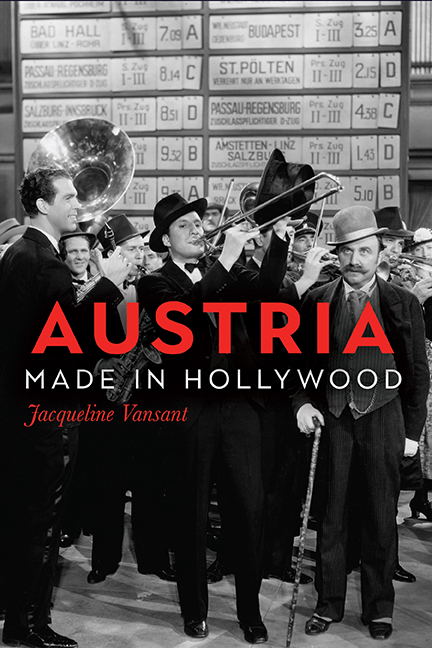Book contents
- Frontmatter
- Contents
- List of Illustrations
- Acknowledgments
- Introduction
- 1 Erich Stroheim, His Austria(ns), and Their US Contexts
- 2 Cross-Cultural Encounters of the Intimate Kind: Hollywood's Americans in Love with Austria(ns), 1932–60
- 3 The Empire Strikes Back: Imperial Austria Fights Nazis, 1938–41
- 4 Reflections and Refractions of the Anschluss on the Hollywood Screen, 1941–42
- 5 Confronting and Escaping History: The Cardinal (1963) and The Sound of Music (1965)
- Conclusion: Hollywood's Austria—Its Past, Present, Future
- Appendix: Hollywood Films Set in Austria
- Notes
- Bibliography
- Index
4 - Reflections and Refractions of the Anschluss on the Hollywood Screen, 1941–42
Published online by Cambridge University Press: 04 April 2019
- Frontmatter
- Contents
- List of Illustrations
- Acknowledgments
- Introduction
- 1 Erich Stroheim, His Austria(ns), and Their US Contexts
- 2 Cross-Cultural Encounters of the Intimate Kind: Hollywood's Americans in Love with Austria(ns), 1932–60
- 3 The Empire Strikes Back: Imperial Austria Fights Nazis, 1938–41
- 4 Reflections and Refractions of the Anschluss on the Hollywood Screen, 1941–42
- 5 Confronting and Escaping History: The Cardinal (1963) and The Sound of Music (1965)
- Conclusion: Hollywood's Austria—Its Past, Present, Future
- Appendix: Hollywood Films Set in Austria
- Notes
- Bibliography
- Index
Summary
AFTER THE LAST HOLLYWOOD HOLD-OUTS, Twentieth Century-Fox, MGM, and Paramount, had been expelled from Germany by fall 1940, alienating the German market was no longer an issue. By that time Hitler had swallowed up much of Europe and was engaged in the Battle of Britain. Yet, anti-Nazi films still made up a very small part of Hollywood's total output in 1941. With much of the European market eliminated, domestic concerns dominated. In response to the slump in business in Detroit in May 1941, a reporter for Variety speculated that “too many pictures and too many newsreels with a militant ‘cause’ or propaganda slant have cooled the public, particularly in the isolationist mid-West, on the pictures.” No matter what the politics of those in Hollywood might be, American audiences seemed reluctant to attend pictures dealing with the National Socialist threat here or abroad.
Moreover, directly addressing the European situation in Hollywood entertainment could turn out to be more than just a poor investment. In August 1941, Senators Gerald Nye and Bennett Champ Clark introduced Senate Resolution 152, which called for “a thorough and complete investigation of any propaganda disseminated by motion pictures and radio or any other activity of the motion-picture industry to influence public sentiment in the direction of participation by the United States in the present European war.” So Ends Our Night and They Dare Not Love, two films in which the Anschluss finally appeared as more than just a passing reference, were included among seventeen films that caught the subcommittee's attention during the September hearings. Although short-lived, the hearings nonetheless underscored the scrutiny Hollywood faced from vocal isolationists for such a small percentage of its production. However, even when the United States declared war on Germany in December 1941, filmmakers rarely turned to Austria to attack German politics.
Although the demise of Austria as a sovereign state did not lack drama, translating its political significance for Americans three years after the fact would not be an easy task. At the time of the Anschluss, Americans may have read about it in newspapers, heard the live radio reports from foreign correspondents such as Edward Murrow, or seen newsreel footage.
- Type
- Chapter
- Information
- Austria Made in Hollywood , pp. 95 - 112Publisher: Boydell & BrewerPrint publication year: 2019



